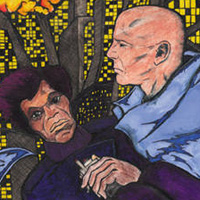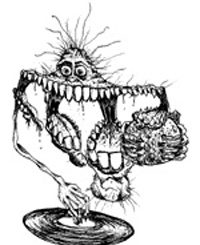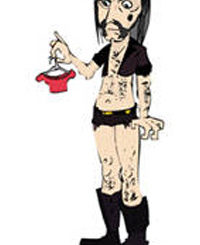 Graffic Traffic
Graffic Traffic
by Ryk McIntyre
We here at GT would like to thank all the publishers who are starting to send us review material, the stuff, the shit, the poopala..
There is such a thing as a free lunch sometimes, but you never know what you’re gonna get. I did somewhat groan to see a large package from Antarctic Press. Not that it’s crap, but of all reviewers of the animé form… I’m not one of them. But still, there were surprises to be found, notably the Vaughn Bodé-ish Perazim and Cell, a standout in terms of it’s non-animé art style, and grittier storyline. For the sweaty-palmed, there were a couple copies of Genus, an “adults only”-labeled bit of hardly-core, although Woolf’s Lair, a story in issue #21, had an endearing bondage-lesbian love story, supplemented by D. Clark’s expressive story-telling. Rounding it all out were the first two issues of the four-part Warrior Nun Areala mini-series. Scripted by Steve Englehart and with color art, it’s a step up in format quality for AP, and it pays off. More stuff like this and they should hold on in today’s ugly retail scene.
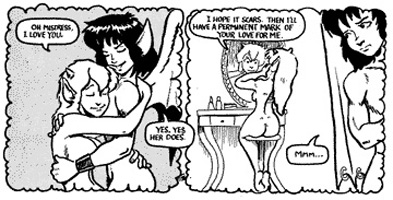 The best war story in graphic form since Art Speigelman’s Maus, Fax From Sarajevo (Dark Horse – Story& Art: Joe Kubert) is the human face put on a story that, for most of us, was just news headlines. When war broke out in Bosnia, businessman/art agent Ervin Rustemagic found himself, his family, and his country cut off from the outside world, his fax machine, the only connection to the rest of Europe and in America, the only medium to have his story heard. What follows is a raw-scraped, brutal look inside the atrocity of war, and there is no-one better for that than Joe Kubert, whose art style has defined the “war comic” and whose sensitivity as a story-teller brought forth what I believe was the first popular portrayal of “the enemy” as a human being. I refer, of course, to his Red Baronesque Enemy Ace, which appeared in many of DC’s war anthologies as well as some solo books. Here, Joe turns Ervin’s grim reports and desperation to save his family into a universal story of human desperation and survival. Weighing in at 180 pages, complete with 23 extra pages of notes and photos, and even a happy ending for Ervin and his family, this is an important book well worth your support.
The best war story in graphic form since Art Speigelman’s Maus, Fax From Sarajevo (Dark Horse – Story& Art: Joe Kubert) is the human face put on a story that, for most of us, was just news headlines. When war broke out in Bosnia, businessman/art agent Ervin Rustemagic found himself, his family, and his country cut off from the outside world, his fax machine, the only connection to the rest of Europe and in America, the only medium to have his story heard. What follows is a raw-scraped, brutal look inside the atrocity of war, and there is no-one better for that than Joe Kubert, whose art style has defined the “war comic” and whose sensitivity as a story-teller brought forth what I believe was the first popular portrayal of “the enemy” as a human being. I refer, of course, to his Red Baronesque Enemy Ace, which appeared in many of DC’s war anthologies as well as some solo books. Here, Joe turns Ervin’s grim reports and desperation to save his family into a universal story of human desperation and survival. Weighing in at 180 pages, complete with 23 extra pages of notes and photos, and even a happy ending for Ervin and his family, this is an important book well worth your support.
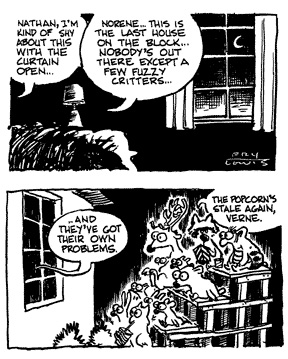 After that, what could we follow up with but Marvel’s SuperDollar Idea®, StarTrek/ X Men, the book that asks the question no one else will. Hey, don’t look at me, I’m not going to ask it either. Built around one of those “how about an inter-dimensional rift between their two universes, and two of the worst villains meet so the heroes team up and win” premises, it actually hurts to say… it isn’t all that bad. No, really. Some decent art, a story that at least has flow and dialogue that has it’s moments, writer Scott (goofy) Lobdell shows a handle on the original Enterprise characters, sponging off some Peter David-ish moments, the same way his X Men seem cut out of Claremont cloth. You could be cynical and point out how a third of the book is promo for the new Star Trek books Marvel is putting out, now that they have the licensing, and that’s OK with me.But for true culture sugar shock, I’ll take Over The Hedge (Andrews and McMee Press) by Michael Fry and T. Lewis. Appearing in newspapers all over, and now in it’s first collection, Over The Hedge features the media-fattened, wild-instinct-betraying pair of Verne, the turtle with no self-esteem (Good God! He even worships Martha Stewart!!!) and the cynical, preservative-stuffed raccoon R.J. What they do is eat out of garbage cans, surf the Inter-net, chase after hopelessly disinterested babes, listen to the best of the ’70s, mooch off of Nate and Noreen (a suburban couple that never appear on panel, it seems) and in general turn their backs on the wild to glut themselves on the stinkiest cheese our culture can mold.
After that, what could we follow up with but Marvel’s SuperDollar Idea®, StarTrek/ X Men, the book that asks the question no one else will. Hey, don’t look at me, I’m not going to ask it either. Built around one of those “how about an inter-dimensional rift between their two universes, and two of the worst villains meet so the heroes team up and win” premises, it actually hurts to say… it isn’t all that bad. No, really. Some decent art, a story that at least has flow and dialogue that has it’s moments, writer Scott (goofy) Lobdell shows a handle on the original Enterprise characters, sponging off some Peter David-ish moments, the same way his X Men seem cut out of Claremont cloth. You could be cynical and point out how a third of the book is promo for the new Star Trek books Marvel is putting out, now that they have the licensing, and that’s OK with me.But for true culture sugar shock, I’ll take Over The Hedge (Andrews and McMee Press) by Michael Fry and T. Lewis. Appearing in newspapers all over, and now in it’s first collection, Over The Hedge features the media-fattened, wild-instinct-betraying pair of Verne, the turtle with no self-esteem (Good God! He even worships Martha Stewart!!!) and the cynical, preservative-stuffed raccoon R.J. What they do is eat out of garbage cans, surf the Inter-net, chase after hopelessly disinterested babes, listen to the best of the ’70s, mooch off of Nate and Noreen (a suburban couple that never appear on panel, it seems) and in general turn their backs on the wild to glut themselves on the stinkiest cheese our culture can mold.
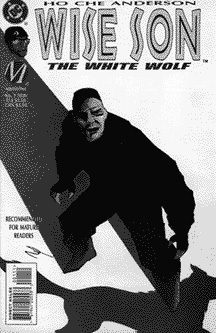 Although it’s a four-part mini-series and over by the time of this writing, I have to recommend Milestone’s Wise Son – The White Wolf (art and story by Ho Che Anderson). Of all the depictions of Minority Characters (caps intended), Milestone always had the best, and this tale of Wise Son, a lead character in the much-missed Blood Syndicate is just the kind of book to keep the broken white hero barrier still open. It picks up from a minor plot line concerning the children Wise has with a woman he all but abandoned, and the fact that his being “down with Islam” never amounted to more than wearing a cap bearing the Moon and Star symbol. Here, Wise confronts the crisis of the soul, aided by an elderly black couple that operate a book store. Ho Che’s story, written from within the Black Man’s world, with fully dimensional human characters, a gritted Urban stage with real violence, and with such raw momentum via his coarse and energetic art style, which lifts this above a super-hero comic, tells of the Spiritual Quest of an imperfect human being who needs to become whole and healed. We should all be such Wise Sons.
Although it’s a four-part mini-series and over by the time of this writing, I have to recommend Milestone’s Wise Son – The White Wolf (art and story by Ho Che Anderson). Of all the depictions of Minority Characters (caps intended), Milestone always had the best, and this tale of Wise Son, a lead character in the much-missed Blood Syndicate is just the kind of book to keep the broken white hero barrier still open. It picks up from a minor plot line concerning the children Wise has with a woman he all but abandoned, and the fact that his being “down with Islam” never amounted to more than wearing a cap bearing the Moon and Star symbol. Here, Wise confronts the crisis of the soul, aided by an elderly black couple that operate a book store. Ho Che’s story, written from within the Black Man’s world, with fully dimensional human characters, a gritted Urban stage with real violence, and with such raw momentum via his coarse and energetic art style, which lifts this above a super-hero comic, tells of the Spiritual Quest of an imperfect human being who needs to become whole and healed. We should all be such Wise Sons.

